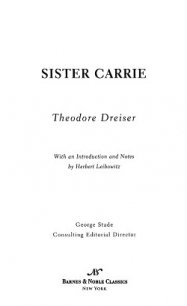Jennie Gerhardt - Драйзер Теодор (книги без регистрации бесплатно полностью сокращений .txt) 📗
and the death of man under the mathematical formula so fearfully
accepted is daily registered.
Lester was one of those who believed in this formula. He was nearing
sixty. He thought he had, say, twenty years more at the utmost to live—
perhaps not so long. Well, he had lived comfortably. He felt that he could not complain. If death was coming, let it come. He was ready at any time.
No complaint or resistance would issue from him. Life, in most of its
aspects, was a silly show anyhow.
He admitted that it was mostly illusion—easily proved to be so. That it
might all be one he sometimes suspected. It was very much like a dream
in its composition truly—sometimes like a very bad dream. All he had to
sustain him in his acceptance of its reality from hour to hour and day to day was apparent contact with this material proposition and that—people,
meetings of boards of directors, individuals and organisations planning to do this and that, his wife's social functions. Letty loved him as a fine, grizzled example of a philosopher. She admired, as Jennie had, his solid, determined, phlegmatic attitude in the face of troubled circumstance. All the winds of fortune or misfortune could not apparently excite or disturb Lester. He refused to be frightened. He refused to budge from his beliefs and feelings, and usually had to be pushed away from them, still
believing, if he were gotten away at all. He refused to do anything save as he always said, "Look the facts in the face" and fight. He could be made to fight easily enough if imposed upon, but only in a stubborn, resisting way. His plan was to resist every effort to coerce him to the last ditch. If he had to let go in the end he would when compelled, but his views as to
the value of not letting go were quite the same even when he had let go
under compulsion.
His views of living were still decidedly material, grounded in creature
comforts, and he had always insisted upon having the best of everything.
If the furnishings of his home became the least dingy he was for having
them torn out and sold and the house done over. If he travelled, money
must go ahead of him and smooth the way. He did not want argument,
useless talk, or silly palaver as he called it. Every one must discuss
interesting topics with him or not talk at all. Letty understood him
thoroughly. She would chuck him under the chin mornings, or shake his
solid head between her hands, telling him he was a brute, but a nice kind of brute. "Yes, yes," he would growl. "I know. I'm an animal, I suppose.
You're a seraphic suggestion of attenuated thought."
"No; you hush," she would reply, for at times he could cut like a knife without really meaning to be unkind. Then he would pet her a little, for, in spite of her vigorous conception of life, he realised that she was more or less dependent upon him. It was always so plain to her that he could
get along without her. For reasons of kindliness he was trying to conceal this, to pretend the necessity of her presence, but it was so obvious that he really could dispense with her easily enough. Now Letty did depend upon
Lester. It was something, in so shifty and uncertain a world, to be near so fixed and determined a quantity as this bear-man. It was like being close to a warmly glowing lamp in the dark or a bright burning fire in the cold.
Lester was not afraid of anything. He felt that he knew how to live and to die.
It was natural that a temperament of this kind should have its solid,
material manifestation at every point. Having his financial affairs well in hand, most of his holding being shares of big companies, where boards of
solemn directors merely approved the strenuous efforts of ambitious
executives to "make good," he had leisure for living. He and Letty were fond of visiting the various American and European watering-places. He
gambled a little, for he found that there was considerable diversion in
risking interesting sums on the spin of a wheel or the fortuitous roll of a ball; and he took more and more to drinking, not in the sense that a
drunkard takes to it, but as a high liver, socially, and with all his friends.
He was inclined to drink the rich drinks when he did not take straight
whiskey—champagne, sparkling Burgundy, the expensive and
effervescent white wines. When he drank he could drink a great deal, and
he ate in proportion. Nothing must be served but the best—soup, fish,
entree, roast, game, dessert—everything that made up a showy dinner—
and he had long since determined that only a high-priced chef was worth
while. They had found an old cordon bleu, Louis Berdot, who had served
in the house of one of the great dry goods princes, and this man he
engaged. He cost Lester a hundred dollars a week, but his reply to any
question was that he only had one life to live.
The trouble with this attitude was that it adjusted nothing, improved
nothing, left everything to drift on toward an indefinite end. If Lester had married Jennie and accepted the comparatively meagre income of ten
thousand a year he would have maintained the same attitude to the end. It would have led him to a stolid indifference to the social world of which
now necessarily he was a part. He would have drifted on with a few
mentally compatible cronies who would have accepted him for what he
was—a good fellow— and Jennie in the end would not have been so
much better off than she was now.
One of the changes which was interesting was that the Kanes transferred
their residence to New York. Mrs. Kane had become very intimate with a
group of clever women in the Eastern four hundred, or nine hundred, and
had been advised and urged to transfer the scene of her activities to New York. She finally did so, leasing a house in Seventy-eighth Street, near
Madison Avenue. She installed a novelty for her, a complete staff of
liveried servants, after the English fashion, and had the rooms of her
house done in correlative periods. Lester smiled at her vanity and love of show.
"You talk about your democracy," he grunted one day. "You have as much democracy as I have religion, and that's none at all."
"Why, how you talk!" she denied. "I am democratic. We all run in classes.
You do. I'm merely accepting the logic of the situation."
"The logic of your grandmother! Do you call a butler and doorman in red velvet a part of the necessity of the occasion?"
"I certainly do," she replied. "Maybe not the necessity exactly, but the spirit surely. Why should you quarrel? You're the first one to insist on
perfection—to quarrel if there is any flaw in the order of things."
"You never heard me quarrel."
"Oh, I don't mean that literally. But you demand perfection—the exact spirit of the occasion, and you know it."
"Maybe I do, but what has that to do with your democracy?"
"I am democratic. I insist on it. I'm as democratic in spirit as any woman.
Only I see things as they are, and conform as much as possible for
comfort's sake, and so do you. Don't you throw rocks at my glass house,
Mister Master. Yours is so transparent I can see every move you make
inside."
"I'm democratic and you're not," he teased; but he approved thoroughly of everything she did. She was, he sometimes fancied, a better executive in
her world than he was in his.
Drifting in this fashion, wining, dining, drinking the waters of this
curative spring and that, travelling in luxurious ease and taking no




